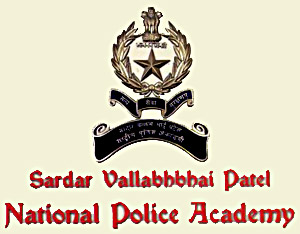Sardar Vallabhbhai Patel National Police Academy is an institution to train the Indian policemen. The Sardar Vallabhbhai Patel National Police Academy aims to prepare leaders for the Indian Police, who will lead the force with respectability, courage, dedication and a strong sense of service for the people of his nation. The Sardar Vallabhbhai Patel National Police Academy endeavors to inculcate in them, such values and customs that would help them to serve the people better. In particular, the academy inculcates reliability of the highest order, sensitivity to aspirations of people in a fast changing social and economic environment, respect for human rights, broad liberal outlook of law and justice, high standard of professionalism, physical fitness and mental alertness. The Sardar Vallabhbhai Patel National Police Academy is the major unit for training police unit leaders and proves to be one of the most regulated institutions all over the country and will provide consultancy services to sister training institutions for improving their management of training.
 The Sardar Vallabhbhai Patel National Police Academy is a center for research studies on police subjects and develops its resource base through tie-ups with related institutions in and outside the country. The institution was built in the commemoration of Sardar Vallabhbhai Patel. He was a freedom fighter, born in Gujarat in the year 1875. He was a student of law in England but returned to India in 1915 and practiced in Ahmadabad. Sardar Vallabhbhai Patel was influenced by the nationalist leader Mahatma Gandhi and joined the Civil Disobedience Movement and successfully organized the landowners of Bardoli against British tax increases in 1928. In 1931 Sardar Vallabhbhai Patel served as president of the Indian National Congress. The British imprisoned Sardar Vallabhbhai Patel several times for his activities. The Sardar Vallabhbhai Patel National Police Academy follows the principles of this former Deputy Prime Minister of India (1947 - 1950) who was the man accredited for creation of the All India Services and also for establishing a perfect training institution to train IPS officers.
The Sardar Vallabhbhai Patel National Police Academy is a center for research studies on police subjects and develops its resource base through tie-ups with related institutions in and outside the country. The institution was built in the commemoration of Sardar Vallabhbhai Patel. He was a freedom fighter, born in Gujarat in the year 1875. He was a student of law in England but returned to India in 1915 and practiced in Ahmadabad. Sardar Vallabhbhai Patel was influenced by the nationalist leader Mahatma Gandhi and joined the Civil Disobedience Movement and successfully organized the landowners of Bardoli against British tax increases in 1928. In 1931 Sardar Vallabhbhai Patel served as president of the Indian National Congress. The British imprisoned Sardar Vallabhbhai Patel several times for his activities. The Sardar Vallabhbhai Patel National Police Academy follows the principles of this former Deputy Prime Minister of India (1947 - 1950) who was the man accredited for creation of the All India Services and also for establishing a perfect training institution to train IPS officers.
The National Police Academy (NPA), trains their officers of the Indian Police Service, who have been selected through an All India based Civil Services Examination in Sardar Vallabhbhai Patel National Police Academy. The trained officers will be posted as Assistant Superintendent of Police (ASP), in their individual states under whom the other sub-ranks of police force will be functioning. The recruitment of sub-ranks such as Constables, Sub-Inspectors, Deputy Superintendents of Police is each states prerogative, and will be done by respective state Director Generals of Police, who are again trained in this academy. The Home Ministry of the Government of India controls the IPS cadre and the officer of this service can only be appointed removed by an order of the President of India.
Apart from the basic training course for IPS officers the Sardar Vallabhbhai Patel National Police Academy also arranges for 3 In-service Management Development Programmes for officers of different ranks, including SP, DIG and IG levels of the Indian Police Service. Training of the trainers include IPS Induction Training Course for State Police Service Officers, brief specialized thematic Courses, Seminars and Workshops on particular subjects for all levels of police officers. Foreign police officers and other officers belonging to Army/IAS/IFS/Judiciary, Insurance Companies, Nationalized Banks, Public Sector Undertakings and many others take custom built trainings from Sardar Vallabhbhai Patel National Police Academy. The Academy is affiliated to Osmania University for conducting courses on police subjects for IPS officers.
The Director, an IPS officer himself, controls the Sardar Vallabhbhai Patel National Police Academy. Officer of the rank of Director General of Police and aided by a Joint Director of the rank of Inspector General of Police, 3 Deputy Directors of the rank of DIG of Police, and 13 Assistant Directors are the highest ranks of officers in the faculty of Sardar Vallabhbhai Patel National Police Academy. The 13 Assistant Directors include 8 IPS or SPS officers of the rank of Superintendent of Police from the respective state cadres, a Judicial Service Officer, a Forensic Scientist, a specialist each in Training Methodology, Computers and Wireless. The authorized strength of the faculty of Sardar Vallabhbhai Patel National Police Academy also includes a Professor in Management, a Reader in Teaching Methodology, a Reader in Behavioral Sciences, a Hindi Instructor, a Junior Scientific Officer, 2 Medical Officers, a Photographic Officer and a Chief Drill Instructor. The supporting staff of the academy includes administrative, ministerial and medical staff and other Group D employees. Total staff strength of Sardar Vallabhbhai Patel National Police Academy is around 427.
High-level Academy Board comprising senior civil/police officers, the Union Home Secretary governs eminent educationists. The Board of Sardar Vallabhbhai Patel National Police Academy periodically reviews curriculum and the syllabus of the training methodology of various courses conducted in the Sardar Vallabhbhai Patel National Police Academy.






